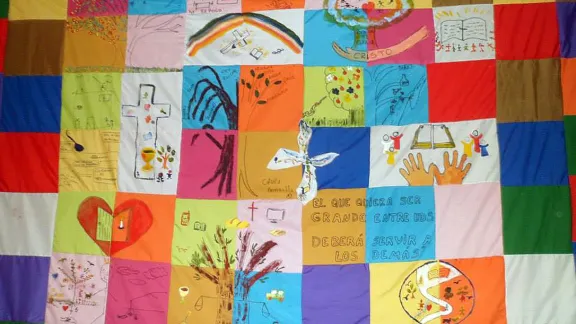
The IERP wiphala symbolizes life in communion amidst different cultures and peoples. Photo: IERP
United Church Synod Launches Its “Ecological Mark”
(LWI) – One of the significant actions from the 2014 synod of the Evangelical Church of the River Plate (IERP) was the launching of the “Time to Put Hands at Work” foundation that focuses on promoting a prophetic, inclusive and diaconal church.
“The Foundation starts a journey that will help to deepen and enhance our commitment to diaconal work with the most oppressed sectors of our society such as indigenous populations and people living with HIV and AIDS,” said IERP President Rev. Carlos A. Duarte.
Over 160 delegates attended the 41st synod and general assembly of the IERP, 9-12 October, the first to be hosted by the Reformed section of the church. It met under the theme “Communion and Engagement in Diversity."
Duarte said the foundation will help the IERP to focus strategically on strengthening women’s leadership within the church and in society, support congregations to build capacity for leadership, fundraising and strategic use of human resources.
Through its theme “Our Ecological Mark” the foundation highlights issues such as deforestation that affect the Mbya Guarani indigenous people, who inhabit the sub-tropical rainforests of Argentina’s northeastern province of Misiones, which is threatened by deforestation. The theme is inspired by the wisdom of Guarani communities and their conviction that ivira omè ê tekove (“from the tree flows life”). Various IERP congregations in Argentina, Paraguay and Uruguay engage the local people in planting native trees, with a goal to restore their forest-dependent livelihoods.
A Blessing in Different Traditions
Duarte spoke about the diversity of traditions in the IERP as “a blessing and a rich aspect” especially as the Lutheran communion prepares to celebrate the 500th anniversary of the Reformation and the Twelfth Assembly of The Lutheran World Federation (LWF) in 2017.
“In the Reformation anniversary, the IERP celebrates unity in Christ. We are a church grounded in the Scriptures, in the faith that Jesus Christ is the Son of God, in ecumenical vocation, diaconal service, and the tradition of being a united church of Protestant traditions,” Duarte said.
Women’s Ordination
The synod also focused on progress made and challenges since the IERP approved women’s ordination nearly three decades ago. “Twenty-nine years ago, the IERP church board unanimously approved ordination to the pastoral ministry, open to all who felt called by God to preach the Gospel and administer the Sacraments. Nine years later, the IERP ordained Rev. Silvia Ramirez,” Duarte said.
To date, the church has 20 ordained women pastors and nine deaconesses. Still, “the church is conscious that discrimination exists in both, society and churches,” Duarte said. However, for the IERP, “it is clear that ordination depends on an individual’s vocation, theological training and gifts for ministry but not on one’s gender, sexuality, race, family name and so forth. Yet, all these characteristics of the rich human diversity must be reflected in our church,” he noted.
”We have equal rights and duties which ensures fairness. Women receive the same salary as men," remarked Rev. Estela Andersen, a pastor in the city of Bahía Blanca. She noted that while there are many congregations who are ready to work with female pastors, "in some places there is still resistance. We [women] have to show that we can carry out our duties just as the men do.”
Cultural Plurality
Celebrating the church’s diversity and the call to serve all people with dignity, synod participants made an IERP wiphala (quilt) with fabrics on which they expressed their thoughts in an artistic way. An Andean symbol, the wiphala represents the union of different peoples and cultural plurality.
“This is a symbol that calls the church to live in communion, enriching each other while sharing our diverse ideas, customs, languages and origins,” noted IERP liturgist Rev. Cristian Stephan.
IERP General Secretary Rev. Sonia Skupch emphasized the relevance of communion and diversity in the IERP. “In a world where injustice and war prevails and where differences make daily life ‘crazy,’ we are committed to fellowship in diversity. The best witness the Church of Jesus Christ can give in this context is the richness to walk together, respecting and valuing peculiar characteristics of each part, different shapes and colors, and be a church that is ecumenically committed, both locally and globally.”


